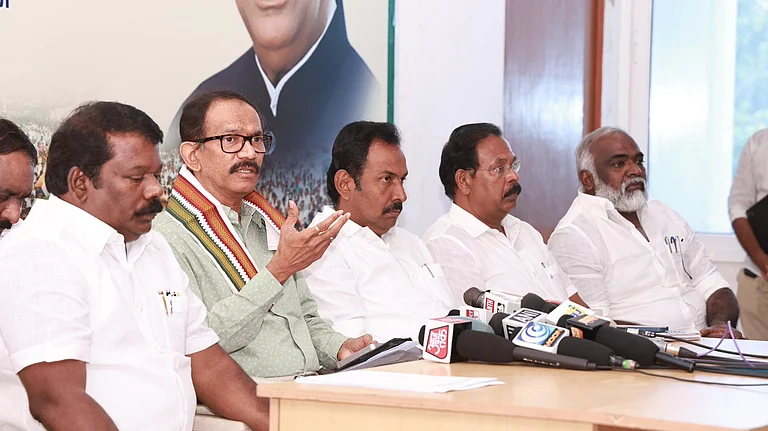Beyond Virat Kohli’s royal blue Bentley and Hardik Pandya’s Patek Philippe watches, it is through the monthly expense sheet of the BCCI (Board of Control for Cricket in India) that we get a 360 degree picture of Indian cricket’s financial muscle, and how its cash river flows to all corners of the country.
You understand, then, why BCCI president Sourav Ganguly and secretary Jay Shah, and almost any Board or state association office-bearer, would be smiling after the Supreme Court’s ruling on September 14. The judgment allows Ganguly and Shah, among others, to have three more years in office, without a cooling-off period.
Scores Of Crores
According to the BCCI website, on May 4 this year, the Board paid Rs 31,72,66,803 to the Uttar Pradesh Cricket Association, towards “Amount due to Association - out of Media rights income of BCCI and Franchisee Consideration for IPL.”
Fifteen days later, Jharkhand State Cricket Association were paid Rs 16,46,10, 265 for the same reason.
A day later, the registers of the Odisha Cricket Association went ka-ching!, as an amount of Rs 8,66,44,531 landed from the parent body.
These were just media rights and IPL related compensations. In a year, there are hundreds of other payments running into eight or more digits that the BCCI pays hotels, vendors, consultants, and as salaries or allowances to staff.
The amounts will get bigger after the Godzilla sized Rs 48,390 crore deal BCCI signed this year with Star and Viacom18 for IPL TV and digital rights, respectively, for the period 2023-27. The deal made the IPL the second highest revenue earning sports property after the NFL (National Football League) in the US.
Sure, Ganguly and Shah don’t need the bucks. But you can never be too rich or too thin, it is said. Ganguly and Shah’s jobs may be honorary by definition, but holding a top BCCI post goes beyond the concept of salary. It gives you control and relevance.
The SC Judgment In Perspective
Before the Supreme Court ruling, time was running out for Prince Shah, often seen wearing Hermes belts, and the Prince of Kolkata, whose sartorial choices have grown discreet, but no less exclusive, over the years. Their tenures were ending in September as per the original laws. These had been laid down by the Supreme Court itself, and on the recommendations of the SC appointed Justice Lodha Committee.
As per those rules, Ganguly and Shah would have had to serve a cooling off period of three years before becoming eligible again for administrative posts.
But the BCCI appealed to the SC for certain amendments. On September 14, the Supreme Court’s two-judge bench – with Justices DY Chandrachud and Hima Kohli – accepted many of the requested amendments.
Team Shah-guly can now skip the cooling off period and stay in power for three more years. The cooling off period comes into play only after two three-year terms, that is six years in a row, in a state association or the BCCI.
However, a person who has been a state administrator for six years can join the BCCI without a cooling off period, as that is the national body. He or she just can’t join another state association without a cooling off period.
Reactions To The SC Ruling
Many thought the Supreme Court’s softened stance defeated the purpose of the Lodha Committee, which was set up after instances of spot-fixing, conflicts of interest and other corruptions in the Board and in Indian cricket. To cap tenures at three years, and then make compulsory a three-year cooling off period, was one of the measures introduced by the Committee.
But the establishment and its supporters batted for ‘continuity’. The word has become their slogan in the last few days. Continuity, they feel, is important if Rome is to be built.
On the other side, Justice Lodha maintained that long tenures can precipitate monopolies. “Our idea of a cooling-off period was based on two facets — it would stop the creation of a monopoly and it would bring new blood into the administration,” he told Indian Express. “Cooling-off is a very important limb of the governance structure to eradicate the formation of a monopoly. If you give a long tenure, it is bound to create a monopoly in favour of a few individuals. It is founded on a well-accepted principle of governance in almost all fields, and sports is one of them.”
What It Means For Indian Cricket
Among the ramifications the judgement has for Indian cricket is the increased whip the Board Secretary will have. As per the court, the Secretary will now have “all powers in relation to cricketing and non-cricketing matters". Also, the BCCI management, the CEO included, will work under the Secretary’s "direct supervision, control and direction."
The amendments also allow the return of public officials, including the pride of India - MLAs and MPs – into cricket administration. Ministers, though, remain barred. Among the names expected to be back in office are Congress MP Rajeev Shukla, once a fixture in Indian cricket, and BJP MLA Ashish Shelar, a former vice-president of the Mumbai Cricket Association (MCA).
Not long ago, Ganguly gave viewers a tour of his Kolkata mansion on a Youtube show. His favourite corner in the mornings, he says in the show, is a quiet room where he has tea and reads the newspaper, starting with the sports page.
“Whether you play or don’t play, the newspaper still opens from the back,” Ganguly says.
He may continue in the BCCI or aim at another throne. Nothing can be taken for granted in Indian cricket. But for now, Ganguly’s tenure, and by extension his time in the news, has been extended. He has more reason to read the paper, sports section first.






















